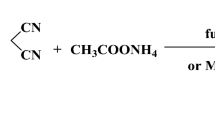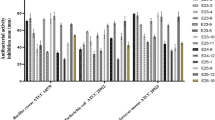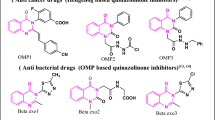Abstract
Three new compounds including two thiodiketopiperazine derivatives shovelmycins A–B (1–2), and one ansamycin derivative divergolide X (3) were isolated and identified from the culture extract of Streptomyces olivaceus HDN22-001, a marine actinomycete obtained from the deep-sea cold seep sediment sample collected from the South China Sea. Their structures and absolute configurations were determined by spectroscopic analyses and ECD calculations. Compound 1 exhibited the strongest DPPH radical scavenging activity with an IC50 value of 10.83 μM, which was better than that of the positive control vitamin C. And compound 2 was modestly cytotoxic against NCl-H446 cell with the IC50 value of 26.6 μM.
This is a preview of subscription content, access via your institution
Access options
Subscribe to this journal
Receive 12 print issues and online access
269,00 € per year
only 22,42 € per issue
Buy this article
- Purchase on SpringerLink
- Instant access to full article PDF
Prices may be subject to local taxes which are calculated during checkout




Similar content being viewed by others
References
Cong M, Pang X, Zhao K, Song Y, Liu Y, Wang J. Deep-sea natural products from extreme environments: cold seeps and hydrothermal vents. Mar Drugs. 2022;20:404.
Rampelotto PH. Extremophiles and extreme environments. Life. 2013;3:482–5.
Brown PD, Lawrence AL. The importance of asking “how and why?” in natural product structure elucidation. Nat Prod Rep. 2017;34:1193–202.
Dubilier N, Bergin C, Lott C. Symbiotic diversity in marine animals: the art of harnessing chemosynthesis. Nat Rev Microbiol. 2008;6:725–40.
Levin LA. Ecology of cold seep sediments: interactions of fauna with flow, chemistry and microbes. Oceanogr Mar Biol. 2005;43:1–46.
Chi LP, Li XM, Wan YP, Li X, Wang BG. Ophiobolin sesterterpenoids and farnesylated phthalide derivatives from the deep sea cold-seep-derived fungus Aspergillus insuetus SD-512. J Nat Prod. 2020;83:3652–60.
Choi BK, Trinh PTH, Lee HS, Choi BW, Kang JS, Ngoc NTD, et al. New ophiobolin derivatives from the marine fungus Aspergillus flocculosus and their cytotoxicities against cancer cells. Mar Drugs. 2019;17:346.
Li X, Li L, Li XM, Li HL, Konuklugil B, Wang BG. Ustusaustin A: a new neuraminidase inhibitory meroterpene from the ascidian-derived endophytic fungus Aspergillus ustus TK-5. Nat Prod Res. 2021;35:4939–44.
Che YH, Wang JF, Ding WP, Xiao ZH, Shi XF, Wu JM, et al. New diketopiperazine alkaloids from the Haima cold seep-derived fungus Toxicocladosporium sp. CYH-18. Phytochem Lett. 2024;60:96–100.
Hu XY, Wang CY, Li XM, Yang SQ, Li X, Wang BG, et al. Cytochalasin derivatives from the endozoic Curvularia verruculosa CS-129, a fungus isolated from the deep-sea squat lobster Shinkaia crosnieri living in the cold seep environment. J Nat Prod. 2021;84:3122–30.
Ying Z, Li XM, Yang SQ, Li HL, Li X, Wang BG, et al. Pseudallenes A and B, new sulfur-containing ovalicin sesquiterpenoid derivatives with antimicrobial activity from the deep-sea cold seep sediment-derived fungus Pseudallescheria boydii CS-793. Beilstein J Org Chem. 2024;20:470–8.
Dong Y, Wang JingE, Bao R, Li Y. H. New Olimycins from a Cold‐Seep‐Derived Streptomyces olivaceus. Chem Biodivers. 2023;20:e202300689.
Jin E, Li H, Liu Z, Xiao F. Antibiotic Dixiamycins from a Cold-Seep-Derived Streptomyces olivaceus. J Nat Prod. 2021;84:2606–11.
Chen CL, Hu SJ, Zhu LL, Yao LM, Wang XX, Zhang AN, et al. Isolation and identification of chemical constituents of Rubi Fructus, screening novel cannabinoid CB2 receptor agonist and evaluation of its anti-osteoporosis effect. Chin Tradit Herbal Drugs. 2024;55:386–401.
Furukawa T, Akutagawa T, Funatani H, Uchida T, Hotta Y, Niwa M, et al. Cyclic dipeptides exhibit potency for scavenging radicals. Bioorg Med Chem. 2012;20:2002–9.
Zhao G, Li S, Guo Z, Sun M, Lu C. Overexpression of div 8 increases the production and diversity of divergolides in Streptomyces sp. W112. RSC adv. 2015;5:98209–14.
Tu L, Shen S, Yan Z, Li X, Liu K, Xu J, et al. Discovery of olimycin E from Streptomyces sp. 11695. Nat Prod Res. 2024;4:1–6.
Frisch MJ, Trucks GW, Schlegel HB, Scuseria GE, Robb MA, Cheeseman JR, et al. Gaussian 09, Revision A.1, Gaussian Inc. Wallingford CT;USA;2009.
Bruhn T, Schaumlöffel A, Hemberger Y, Bringmann G SpecDis, Version 1.53. University of Wuerzburg;Germany;2011.
Sharma OP, Tej KB. DPPH antioxidant assay revisited. Food Chem. 2009;113:1202–5.
Andrews JM. Determination of minimum inhibitory concentrations. J Antimicrob Chemother. 2001;48:5–16.
Mosmann T. Rapid colorimetric assay for cellular growth and survival: application to proliferation and cytotoxicity assays. J Immunol Methods. 1983;65:55–63.
Skehan P, Storeng R, Scudiero D, Monks A, McMahon J, Vistica D, et al. New colorimetric cytotoxicity assay for anticancer-drug screening. J Natl Cancer Inst. 1990;82:1107–12.
Acknowledgements
This work was supported by the Fundamental Research Funds for the Central Universities (202362008, 202172002), the Shandong Provincial Natural Science Foundation (ZR2021MH257), the National Key Research and Development Program of China (2022YFC2804400).
Author information
Authors and Affiliations
Corresponding author
Ethics declarations
Conflict of interest
The authors declare no competing interests.
Additional information
Publisher’s note Springer Nature remains neutral with regard to jurisdictional claims in published maps and institutional affiliations.
Supplementary information
Rights and permissions
Springer Nature or its licensor (e.g. a society or other partner) holds exclusive rights to this article under a publishing agreement with the author(s) or other rightsholder(s); author self-archiving of the accepted manuscript version of this article is solely governed by the terms of such publishing agreement and applicable law.
About this article
Cite this article
Li, C., Cheng, J., Liu, R. et al. The thiodiketopiperazine derivatives shovelmycin A–B and ansamycin derivative divergolide X from the cold-seep-derived Streptomyces olivaceus HDN22-001. J Antibiot 78, 275–280 (2025). https://doi.org/10.1038/s41429-025-00812-z
Received:
Revised:
Accepted:
Published:
Issue Date:
DOI: https://doi.org/10.1038/s41429-025-00812-z



